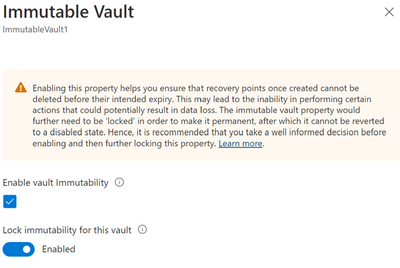Generally available: Immutable vaults with Azure Backup

Azure Backup recently announced the general availability of immutable vaults that offer improved protection for your backup data better against ransomware attacks and other malicious actors. Immutable vaults protect your backups by blocking any operations that could lead to loss of recovery points if misused. Further, you can lock the immutability setting to make it irreversible, which can prevent malicious actors from disabling immutability and deleting backups.
Immutability is generally available for Recovery Services vaults as well as Backup vaults.
How it works
Backup data stored using Azure Backup is not accessible directly and the only way to access or manage this data is through the vault. Immutable vaults further help you by preventing any operations that, if used by malicious actors, could lead to the loss of backups. The Immutable vault setting on your vault enables you to block such operations to ensure that your backup data is protected, even if any malicious actors try to delete them to affect the recoverability of data.
The following operations are protected when using immutable vaults:
For Recovery Services vaults:
|
Operation type |
Description |
|
Stop protection with delete data |
A protected item can't have its recovery points deleted before their respective expiry date. However, you can still stop protection of the instances while retaining data forever or until their expiry. |
|
Modify backup policy to reduce retention |
Any actions that reduce the retention period in a backup policy are disallowed on Immutable vault. However, you can make policy changes that result in the increase of retention. You can also make changes to the schedule of a backup policy. |
|
Change backup policy to reduce retention |
Any attempt to replace a backup policy associated with a backup item with another policy with retention lower than the existing one is blocked. However, you can replace a policy with the one that has higher retention. |
For Backup vaults:
|
Operation type |
Description |
|
Stop protection with delete data |
A protected item can't have its recovery points deleted before their respective expiry date. However, you can still stop protection of the instances while retaining data forever or until their expiry. |
Enabling immutability and making it irreversible
Enabling a vault to be immutable restricts performing certain operations on your backups. So, Azure Backup provides you an opportunity to ensure all your configurations are as per your requirements before you lock immutability to make it irreversible. Hence, when it comes to immutability your vault can have one of the following states for the setting:
|
State of Immutable vault setting |
Description |
|
Disabled |
The vault doesn't have immutability enabled and no operations are blocked. |
|
Enabled |
The vault has immutability enabled and doesn't allow operations that could result in loss of backups. |
|
Enabled and locked |
The vault has immutability enabled and doesn't allow operations that could result in loss of backups. |
You can enable immutability and then make it irreversible (or ‘lock’ it) through vault properties.
Learn more
Check out this article to learn more about immutable vaults for Azure Backup.
Published on:
Learn moreRelated posts
Automating Business PDFs Using Azure Document Intelligence and Power Automate
In today’s data-driven enterprises, critical business information often arrives in the form of PDFs—bank statements, invoices, policy document...
Azure Developer CLI (azd) Dec 2025 – Extensions Enhancements, Foundry Rebranding, and Azure Pipelines Improvements
This post announces the December release of the Azure Developer CLI (`azd`). The post Azure Developer CLI (azd) Dec 2025 – Extensions En...
Unlock the power of distributed graph databases with JanusGraph and Azure Apache Cassandra
Connecting the Dots: How Graph Databases Drive Innovation In today’s data-rich world, organizations face challenges that go beyond simple tabl...
Azure Boards integration with GitHub Copilot
A few months ago we introduced the Azure Boards integration with GitHub Copilot in private preview. The goal was simple: allow teams to take a...
Microsoft Dataverse – Monitor batch workloads with Azure Monitor Application Insights
We are announcing the ability to monitor batch workload telemetry in Azure Monitor Application Insights for finance and operations apps in Mic...
Copilot Studio: Connect An Azure SQL Database As Knowledge
Copilot Studio can connect to an Azure SQL database and use its structured data as ... The post Copilot Studio: Connect An Azure SQL Database ...
Retirement of Global Personal Access Tokens in Azure DevOps
In the new year, we’ll be retiring the Global Personal Access Token (PAT) type in Azure DevOps. Global PATs allow users to authenticate across...
Azure Cosmos DB vNext Emulator: Query and Observability Enhancements
The Azure Cosmos DB Linux-based vNext emulator (preview) is a local version of the Azure Cosmos DB service that runs as a Docker container on ...
